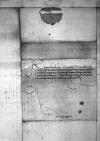Letter #5713
Sigismund I Jagiellon to Ioannes DANTISCUS, Jan SOKOŁOWSKI, Johann von BAYSEN (BAŻYŃSKI) & Paweł PŁOTOWSKIBrest-Litovsk, 1544-07-09
| received Frauenburg (Frombork), 1544-07-24 Manuscript sources:
Auxiliary sources:
| ||||||||||
Text & apparatus & commentaryPlain textText & commentaryText & apparatus
Reverendo in Christo Patri, generosis et venerabili domino
 BNW, BOZ, 953, f. 234r
BNW, BOZ, 953, f. 234r Reverende in Christo Pater, Generosi et Venerabilis, sincere et fideles nobis dilecti.
Quae sit sententia nostra de redimendis bonis nostris Pucensibus, ex litteris commissionis nostrae S(trenuitas) or S(inceritas)⌈S(trenuitas)S(trenuitas) or S(inceritas)⌉ et Fraternitates Vestrae intellexerunt, quas esse iam illis redditas non dubitamus. Nunc hortamur S(trenuitatem) or S(inceritatem)⌈S(trenuitatem)S(trenuitatem) or S(inceritatem)⌉ et Fraternitates Vestras, ut quam fieri potest celerrime, commissioni nostrae satis faciant, atque omni cunctatione semota hoc agant, ut nos primo quoque tempore ad possessionem bonorum nostrorum Pucensium pervenire possimus iuxta formam et modum in litteris commissionis nostrae latius perscriptam. Quo celerius rem confecerint, hoc maiorem sibi gratiam nostram demerebuntur.
Facturae pro fide atque officio suo.
Dat(ae) or Dat(um)⌈Dat(ae)Dat(ae) or Dat(um)⌉
in
Ad mandatum regiae maiestatis proprium

